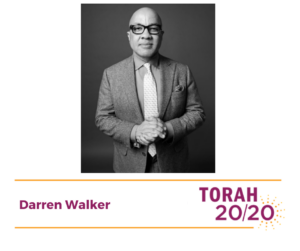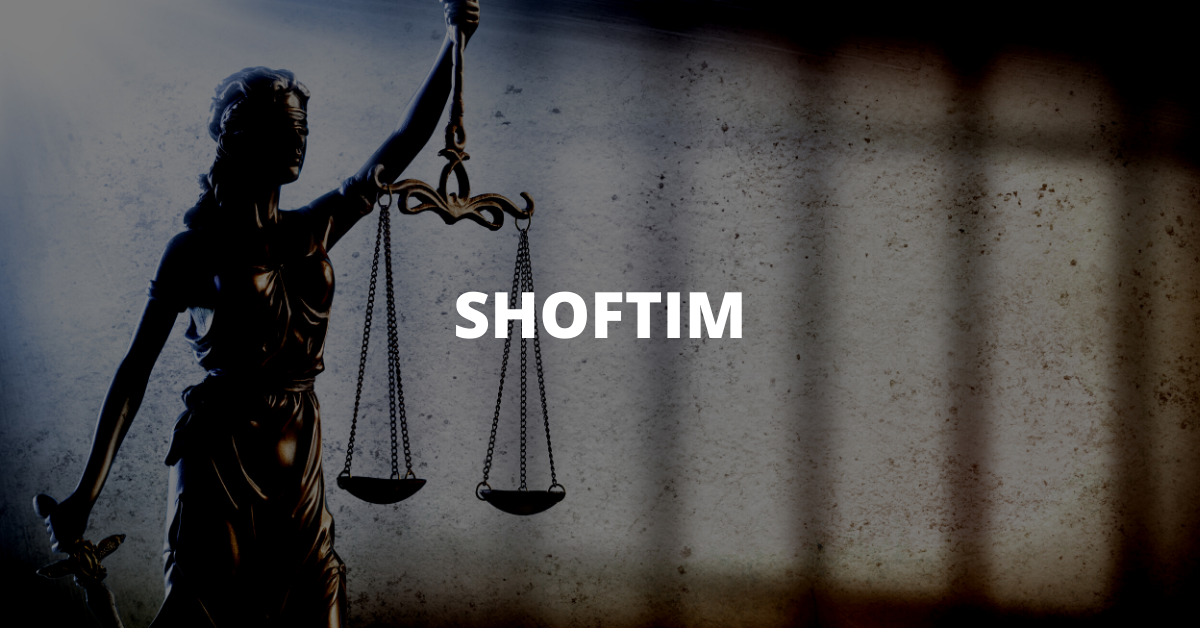A D’var Torah by Darren Walker for Parshat Shoftim
This D’var Torah is in honor of Rabbis Eric and Jenny Solomon’s 22nd anniversary
Last year, TIME Magazine honored Desmond Meade as one of the world’s 100 most influential people for his groundbreaking work to re-enfranchise 1.4 million people with felony convictions in Florida with the Florida Rights Restoration Coalition. He appeared on MSNBC, Al-Jazeera, and PBS for his advocacy. Miami Dade College inducted him into its hall of fame.
That same year, Meade couldn’t find a place to live. That’s because, along with his law degree and numerous accolades, Meade spent three years in jail, from 2001-2004. Now, almost two decades later, the system he seeks to transform still punishes him because of his criminal record.
Meade’s story demonstrates that we have two justice systems in America — one of which funnels poor people and people of color into prison. If you grow up in a low-income community of color, you’ll likely face disproportionate contact with police forces. Once arrested, pretrial release often requires cash bail, forcing low-income defendants to spend time in prison awaiting trial and pushing them to accept plea deals. During trial, prosecutors are twice as likely to sentence African Americans to offenses with mandatory minimum sentences than white people with similar cases.
Even after they’ve served time, our criminal justice system prevents people with felony convictions from reentering society instead of granting them a fresh start. It’s nearly impossible for someone with a criminal record to get an occupational license — required by roughly one-fourth of U.S. jobs. In some states, people with felony convictions still can’t receive government benefits like food stamps. Even for exceptionally successful individuals like Meade, it’s outrageously difficult to rent a home with a criminal record. Formerly incarcerated individuals are almost 10 times more likely to be homeless.
Sign up to receive Torah 20/20 in your inbox each week.
Our country’s system of mass incarceration has countless compounding effects, especially during this global pandemic. With their cramped quarters, short supply of soap, and shared bathrooms and dining hall, jails and prisons are prime breeding grounds for the virus. Thousands of people in state and federal prisons across the country have been infected by COVID-19, but many of them were already robbed of a future — arrested for misdemeanors as minute as violating parole.
Meade’s story, and the unfairness it illustrates, leapt to mind as I read this week’s Torah portion, famous for its injunction: “Justice, justice shall you pursue.” According to the Chasidic master Rabbi Simcha Bunim of Peshischa (Poland, 1767-1827), “justice” is repeated not merely for poetic emphasis but to signify a process as well as an aspirational outcome. Justice is both a means and an end.
When our methods are just, our system doesn’t grant privileges to the powerful and strip protections from the vulnerable. As the Torah formulates it this week, “You shall not judge unfairly: you shall show no partiality; you shall not take bribes.” The justice system ought to represent all equally — wealthy and poor, advantaged and disadvantaged alike. That means a system where police don’t unfairly target low-income communities of color, or where a non-violent offense or technical violation never leads to a death sentence.
Justice alone as a means, however, is not enough. We also need to pursue just outcomes — including the possibility of redemption, not retribution. This week’s parshah tells the story of a man who, trying to cut down a tree, loses hold of his axe and accidentally kills a friend. Instead of being punished for punishment’s sake, the man is sent to live in another city to rebuild his life, free from the grieving family’s resentment. The Torah reminds us to let people learn and grow from their missteps. A fair, equitable system should lift people up, not lock them away.
Find more commentaries on Parshat Shoftim.
Meade’s work exemplifies how we can fight for both just methods and outcomes. As President of the Florida Rights Restoration Coalition, Meade led the movement that passed Amendment 4, restoring voting rights to over 1.4 million Floridians with past felony convictions. That’s 15 percent of Florida’s population — the largest American expansion of enfranchisement in a generation. Re-enfranchisement represents a just process; it rights a Jim Crow policy created to exclude African Americans from politics. And it also provides a just outcome: once you’ve served your time, you’re granted the same rights as everyone else.
But Meade’s work isn’t finished — and neither is ours. Following the victory of Amendment 4, the Florida state legislature passed a poll tax expected to massively suppress voter turnout. Meade and the coalition are contesting these unfair terms; we can support their fight by volunteering, online or in person, or we can get involved in similar campaigns being waged across the country.
The good news? Campaigns like Meade’s show how grassroots activism can make our justice system more just, and our democracy fairer, stronger, and more inclusive. Whether we’re knocking on doors, lending our resources, or writing letters to lawmakers, our voices have power.
When we work together to create a system that represents and reflects us all, we make good on our timeless obligation: to pursue justice, justly.
 Darren Walker is president of the Ford Foundation, a $13 billion social justice philanthropy with offices in the U.S. and ten global regions. For two decades, he has been a leader in the nonprofit and philanthropic sectors. Darren led the philanthropy committee that helped bring a resolution to the city of Detroit’s historic bankruptcy, and chairs the U.S. Impact Investing Alliance and the Presidents’ Council on Disability Inclusion in Philanthropy. He serves on the boards of Carnegie Hall, the High Line, VOW to End Child Marriage, Committee to Protect Journalists, National Gallery of Art, and the Smithsonian National Museum of African American History & Culture. Educated exclusively in public schools, Darren was a member of the first Head Start class in 1965 and received his bachelor’s and law degrees from The University of Texas at Austin. He has been on Time’s annual 100 Most Influential People in the World.
Darren Walker is president of the Ford Foundation, a $13 billion social justice philanthropy with offices in the U.S. and ten global regions. For two decades, he has been a leader in the nonprofit and philanthropic sectors. Darren led the philanthropy committee that helped bring a resolution to the city of Detroit’s historic bankruptcy, and chairs the U.S. Impact Investing Alliance and the Presidents’ Council on Disability Inclusion in Philanthropy. He serves on the boards of Carnegie Hall, the High Line, VOW to End Child Marriage, Committee to Protect Journalists, National Gallery of Art, and the Smithsonian National Museum of African American History & Culture. Educated exclusively in public schools, Darren was a member of the first Head Start class in 1965 and received his bachelor’s and law degrees from The University of Texas at Austin. He has been on Time’s annual 100 Most Influential People in the World.

